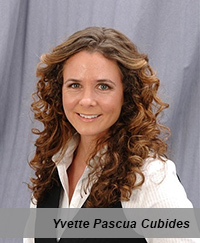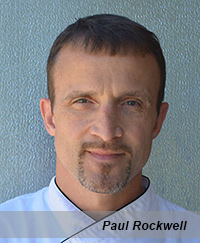Chefs in the Lab
CULINARY POINT OF VIEW
Culinary training is an obvious choice for many people who love food and the idea of making a living in food. In fact, the popularity of chefs in today’s culture may mean that other food industry careers, such as food science or nutrition, are overlooked or undiscovered. Some chefs start out cooking in restaurants and then return to school to pursue advanced degrees in food science. This rare breed of professional is able to offer the creativity of a chef with the methodical and analytical mind of a scientist.
Here, we talk to Yvette Pascua Cubides (senior research scientist, Hershey Company), Paul Rockwell (corporate chef, Diversified Foods & Seasonings), and Heather Mendenhall (product development specialist, Georgia Nut Company)—three food science professionals who all began their careers in the kitchen—to learn how their culinary experience and food science education unite in their current jobs.
 Q: You all started out in the culinary world and went on to obtain advanced degree(s) in food science and technology. What was the impetus for that move?
Q: You all started out in the culinary world and went on to obtain advanced degree(s) in food science and technology. What was the impetus for that move?
Yvette Pascua Cubides: I was working as a pastry chef for a while and I found myself getting so frustrated when a dessert wouldn’t work and I couldn’t explain why. So I decided to go back to school and study nutrition, since I had never heard of food science. One day we had Dr. Allen [Jonathan Allen] from North Carolina State University as a guest lecturer and he did a demonstration on how the tannins in iced tea chelate the iron and it precipitates and falls to the bottom of the glass. He explained that’s why you should never drink iced tea with your meat-based dinner, because your body won’t be able to absorb the iron. I had never seen anything like that. The next semester I transferred to NC State to study food science.
Paul Rockwell: For me, it was a lot curiosity about why certain things happen during the cooking process. So, I just started nosing around on the Internet and various books trying to learn all that I could and I finally came across food science. Having cooked professionally for several years I thought I knew a lot about cooking, but once I immersed myself in food science, I realized I didn’t know that much.
Heather Mendenhall: I decided to go back to school after closing my restaurant. I thought maybe I’d gone as far as I wanted to in the cooking and restaurant industry. I was interested in seeing what else was out there for me.
Q: Did your background in culinary arts help your studies in food science? In what way(s)?
Cubides: Yes, because I could relate everything to my experiences in the kitchen—my failures and successes. I was finally able to understand why certain things worked and others didn’t. For example, I made a passion fruit pâte de fruit for an event once and while I had made pâte de fruit 1,000 times before, I usually used raspberry or pear. This time I decided to be fancy and make it with passion fruit. So it was 10 minutes before dinner service and I needed to cut them up to serve and I discovered that it was soup—it hadn’t set. And I didn’t understand why. But now I know why—there’s pectinase enzymes. It’s such a simple thing, but I had never heard of an enzyme. I didn’t know what that was. So food science was really a mystery solver for me.
Rockwell: I think that I was better able to visualize what takes place during the cooking process because I’d seen it on various levels and repeatedly in the kitchen. Just having the exposure to a broad range of food and different types of food packaging—both as a home cook and then seeing the foodservice side of it and how things are packed there. So, yes, having worked with food so much and having seen how processed food is used in the restaurant world was also a big help.
Mendenhall: I think that chefs in general kind of have a scientific approach to what they do even if they don’t know it—with developing recipes and cooking techniques. And many chefs are curious people who are driven to make the best food they can, which can lead to a bit of experimentation. I had a fair amount of experience with food going into my food science coursework and I think that made it easier for me to understand some of the concepts I learned in the classroom because I had seen it in practice for years.
 Q: Can you describe how food science and culinary intersect in your current position?
Q: Can you describe how food science and culinary intersect in your current position?
Cubides: I think my culinary background helps my food science work in two ways. Firstly, I’m making prototypes, so the creative side comes back in when I’m playing around in the kitchen. Once we make a prototype that looks successful, we need to see if it’s scalable. So we go into the pilot plant and produce it on a large scale. In that regard, timing, multitasking, people management, and preparation become really important. And those are skills that I learned in the kitchen.
Rockwell: Budget constraints and ingredient constraints are where culinary and food science intersect in my job. I’ll start out making a gold standard but then you have to start tweaking the formula to make it affordable for the client. For example, you may not be able to use all heavy cream in a recipe, so instead you use some water, hydrocolloids, starches, and fat to mimic the cream. And you need to add in functional ingredients like emulsifiers in order for the food to withstand the process of being cooked on a large scale, frozen, shipped, and finally reconstituted at the restaurant.
Mendenhall: I think the culinary portion really comes into play with ideation of products and initial formulation. Having years of hands-on experience with food, I’m not shy about just going into the lab and mixing things together even if my boss says they won’t work. The science comes in when we’re scaling up and troubleshooting problems. It’s pretty unusual for something to scale up from the benchtop to production without any problems. Usually, you’ve got to have the science to be able to solve those problems.
Q: If you were put back in a restaurant kitchen today, would you approach your job as chef differently with your acquired food science knowledge? Would it change anything about the way you cook?
Cubides: I think I’d be terrible—I would overthink and overanalyze. And I know too much about microbiology now. I think there’s a spectrum. On one end of the spectrum is the scientist, who is very black and white, and on the other end is the chef, who is very creative. I started out on the creative side and then started learning more and more about food science and as I did I slowly moved over to other side of the spectrum. I think more analytically than creatively now.
Rockwell: Yeah, I would definitely. Now I would scrutinize everything from each ingredient in a dish to the preparation process. This comes from my experience scaling up dishes for mass production now. If we are trying to shave pennies off the cost, I need to question every ingredient—why it is in the dish and is it the optimal amount?
As for process, if you look at some cookbooks, it’ll say soak this for two hours or simmer it for 45 minutes. I would be asking myself if I really needed to simmer it for 45 minutes, or do I need to bring it up to a boil and then cut it off. In a manufacturing plant, if you don’t have to simmer something for 45 minutes then you don’t want to. So I think that’s what would be the big difference in how I would operate in a restaurant kitchen today.
Mendenhall: I might be more hesitant to do some things that I used to do just because that’s how you do it and you don’t really know why. But now I have learned all the science behind it.
 Q: What is one food science learning that you think chefs could benefit from?
Q: What is one food science learning that you think chefs could benefit from?
Cubides: I really think that all chefs could benefit from knowing just the basic fundamentals of food science, such as water activity and enzymes. Like the fact that enzymes have optimal environmental conditions in which they work and don’t work. If they knew that they could manipulate their system to perform in a way that they want. There’s all these little tricks that they could use if they just knew that they existed.
Rockwell: That there are multiple and various deteriorative vectors that are at work in food. Food is in a constant state of change. Once it’s harvested, it starts to deteriorate and, depending on the food, that process happens in different ways. For instance, spoilage microorganisms and pathogenic microorganisms are two different things. Just because something might be old and not taste as good doesn’t mean that it’s unsafe, and vice versa, just because it doesn’t seem like it has gone bad doesn’t mean that it is safe. Everything is working against the food—be it air, water activity, temperature, or light. I think understanding what’s at work against the food and the techniques to preserve it could be extremely useful for a chef.
Mendenhall: I think it would be reminding them that food science really isn’t that much of a mystery. It’s the theory behind what they [chefs] use in practice every day. They already understand a lot of food science even if they don’t know the theories or they don’t use the same words to describe what they see.
Q: What could food scientists learn from chefs?
Cubides: I think scientists can lack vision. They make a small experiment on the large scale, but they can’t take that small thing and translate it into a final product. I can do that because I can see the potential of where it is going. I can see multiple applications because I can think back on my culinary experiences and think, “where does it fit in?” I think a lot of times my research peers who haven’t played around in a kitchen enough aren’t able to see the end game.
Rockwell: Simple—food needs to look, smell, and taste appealing. I think when we get into this world of food processing, we kind of lose sight that what we’re working with here is food and that ultimately someone is going to eat it. We try to save pennies here and there, shave time off the production process, and make sure we have the right kind of packaging, but it always comes down to whether the food is good or not. And that’s what chefs ultimately care about the most.
Mendenhall: I think that it’s always important to remember that you’re working with food. Sometimes it’s easy to get so lost in science that you forget that you’re making food. The bottom line is that it has to taste good. And if you don’t want to eat it, the chances are pretty good consumers aren’t going to want to eat it either.


